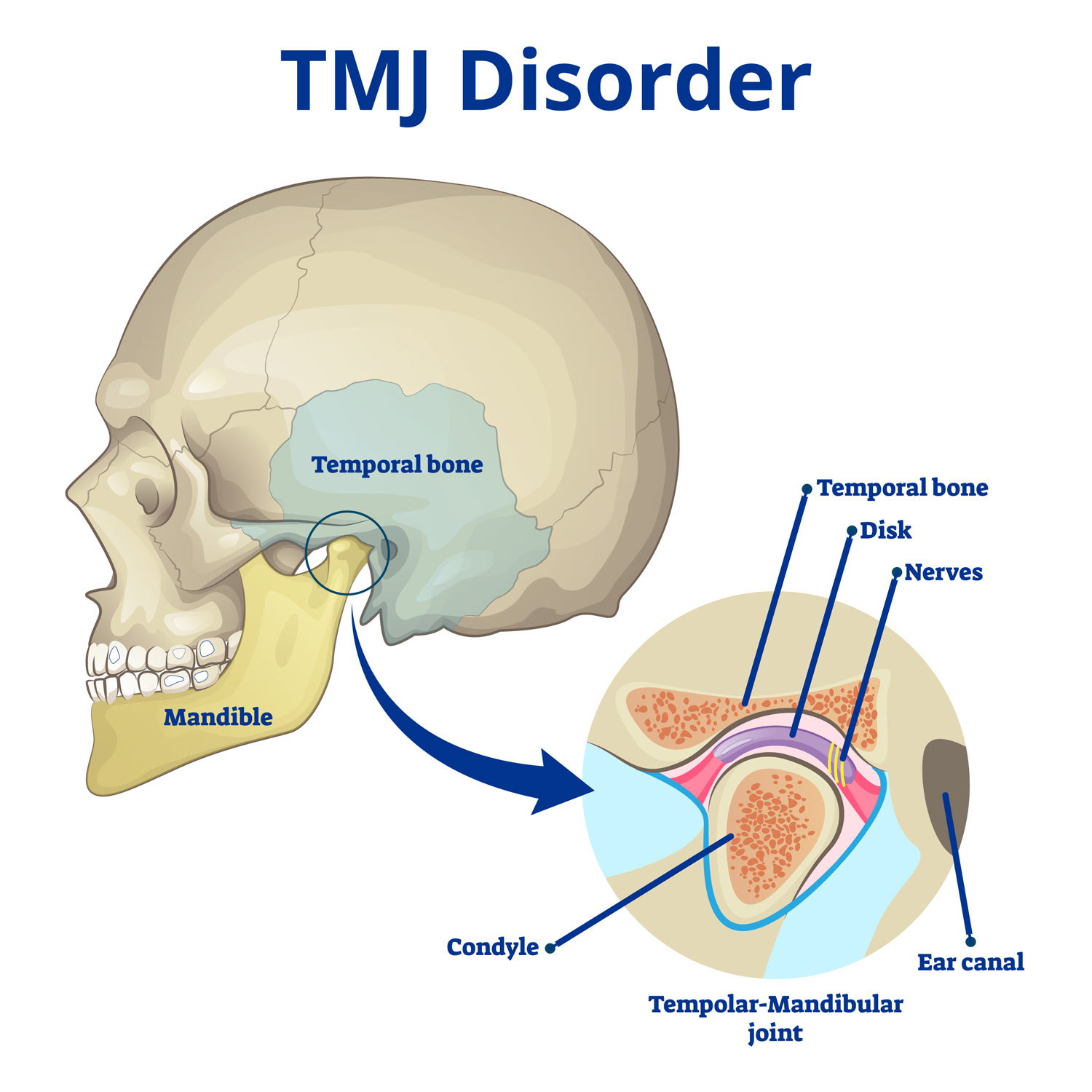CONDITIONS WE TREAT:
CONDITIONS WE TREAT:
Jaw Pain / TMJ Pain Treatment in Bel Air, MD
Jaw Pain / TMJ Treatment in Bel Air, MD
Defining TMJ
TMJ is the acronym for the Temporomandibular Joint (TMJ), commonly referred to as the jaw, but is also referred to as TMD, TMJD, or TMJS. TMJ is the name of the joint but TMJ can also be used to describe the painful conditions of the jaw. The jaw joint can be a source of great pain and discomfort for anyone who has TMJ.
Causes of TMJ pain
The way the jaw works is surprisingly much like the knee — which is a hinge joint with a meniscus or disc, cushioning and aiding in joint movement. The TMJ disc attaches to the ear canal and contains many nerves. This disc is very fragile and sensitive and can be affected in many ways. TMJ pain may also be caused by neck injuries.
- Injuries/ Trauma:
- Trauma to the head, neck and face
- Concussions
- Car accidents
- Normal Activities:
- Posture
- Genetics
- Stress
- Clinching and grinding of the teeth
- Regular Life Events:
- Dental work
- Food
- A lot of singing or talking
- Trying to open a beer bottle or crab shell with your teeth

TMJ Frequently Asked Questions
Pain: Why does my jaw hurt?
The joint of the jaw, like any other joint is subject to the wear and tear of life. This then can lead to dysfunction that in turn can cause pain and muscles spasm like other joints. Pain can be felt in the jaw itself, but also face, ear and neck
Headaches: Can TMJ cause headaches?
The joint itself is part of the skull. And in that the muscles that control the TMJ encompass most of the entire side of the face and skull; spasm and tension in this area commonly leads to headache.
Ringing In The Ear: Can TMJ cause ringing in my ear?
The TMJ actually attaches to the ear canal. Anytime there is irritation in the TMJ, it can also affect the ear canal. This then leads to symptoms of fullness, pressure and/or ringing in the ear. Patients may also feel pain in the ear, fullness or pressure all of which can affect hearing or cause dizziness.
Post Dental: I just had dental work and now my jaw hurts. Why is this happening?
The TMJ is a very sensitive joint. Holding it open for long periods, much less forcing it open or into other positions, along with yanking on it, can lead to damage.
Clicking: My jaw is popping, clicking, or locking what can I do?
Inside the TMJ, there is a disc, much like the meniscus of the knee, that separates and facilitates movement between the bones of the jaw. This disc can swell or become damaged causing the jaw to catch, leading to locking and clicking. This can also cause limited range of motion in the jaw.
What is the treatment for TMJ?
Most people see a dentist first for treatment and often get mouthguards; this can fix the issue if your problem is being caused at night. If not, then you need to seek care. Chiropractic and physical therapy are great solutions to heal the joint and the surrounding areas.
Our staff will customize a treatment plan which may include:
- Chiropractic Manipulation: Gentle Chiropractic adjustment to jaw, head, and neck. Yes, you can adjust the jaw! Adjustments will correct the functional movement of the jaw joint and increase range of motion. Correcting issues in the neck will allow the nerves and muscles that work the jaw to function properly.
- Physical Therapy:
• Trigger point specific massage therapy to loosen the muscles of the jaw, head and neck.
• Ultrasound or laser to control pain and inflammation and increase mobility.
• Exercises to strengthen the muscles in the area.
Each and every patient is unique, and all treatment plans are customized to accommodate the specific cause of TMJ, treat the symptoms, heal the injury, and strengthen the area. We believe in not only relieving the pain and range of motion restrictions but healing in such a way that symptoms do not return.

Treatment Pictured: Ultrasound used to decrease pain, reduce inflammation, soften scare tissue from damaged muscle.
Our providers will assess your condition, find the root cause of your pain, and customize a treatment plan. Call today!
TMJ Pain Treatment Client Testimonials
“TMJ was taking over my busy life as a SAHM (stay at-home mom) of two small children. I could barely get through the day due to the pain in my head and jaw. Thank goodness I found Dr. Lee to help me. He explained to me that the TMJ Disorder was caused not only by my clenching and teeth grinding but also by muscle tension in my neck and back. After a few adjustments I started feeling much better, and now I am pain-free. The whole team at Susquehanna Spine & Rehab really cares about their patients. They always made appointments convenient for me allowing me to bring my two children. Dr. Lee is now treating my Plantar Fasciitis that developed during my first pregnancy 6 years ago. Thank you Dr. Lee and staff!”
– Patti, age 38
